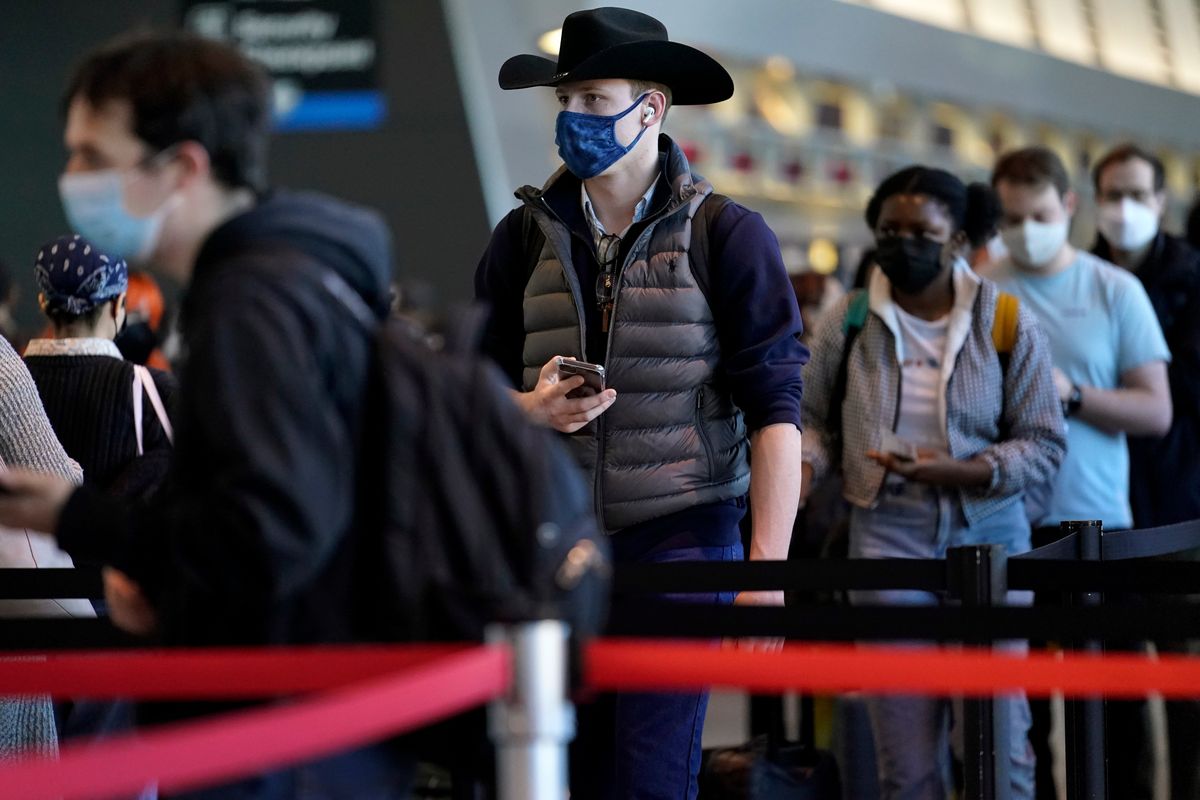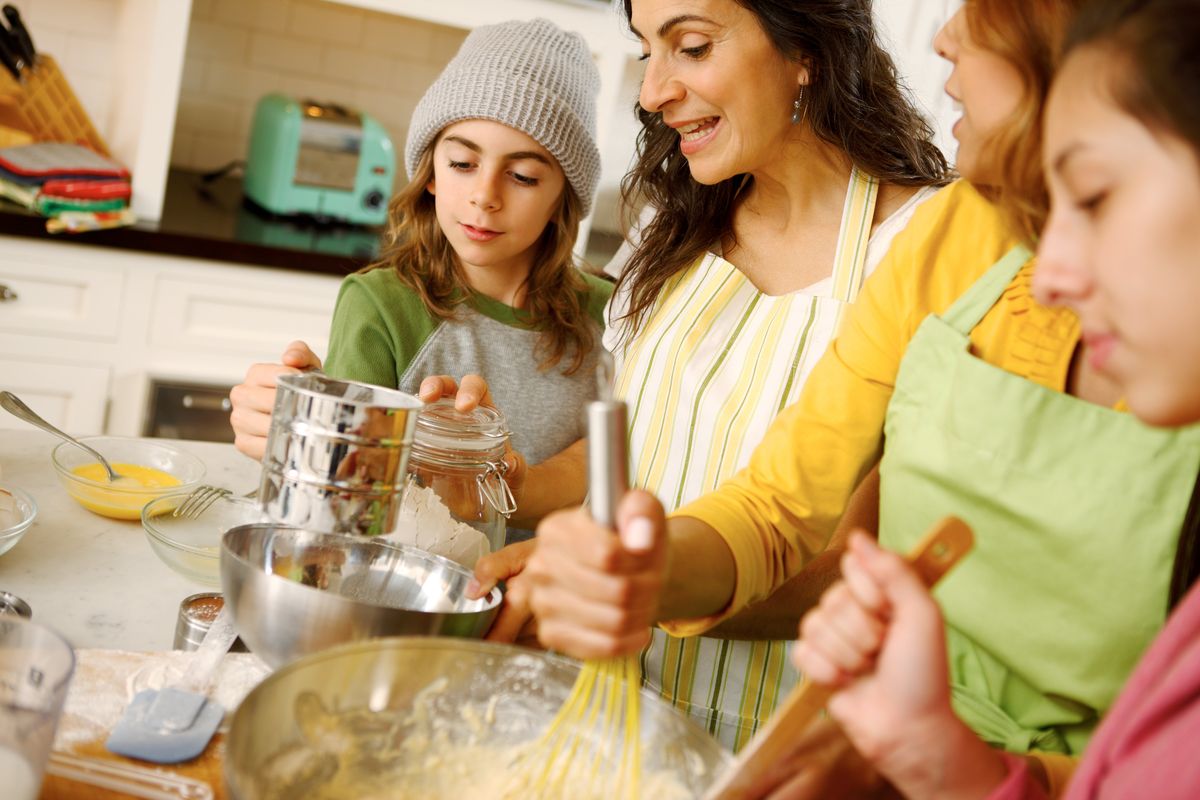House Call: Navigating pandemic holiday season 2.0
Travelers wait in line while entering a security checkpoint at Logan International Airport in Boston on Nov. 24. (Steven Senne/Associated Press)
So here we are, entering the second holiday season in the face of the COVID-19 pandemic. A lot has happened since this all started, and we know so much more now than we did a year ago. We also are much better prepared, having more than 61.4% of our Spokane County community over age 12 fully vaccinated, and with many others having received some natural immunity. So how should we prepare this year going into the holidays?
This time of year is all about spending time with the people we love and reconnecting with friends. Like many of you, our family tradition was always a multigenerational gathering with kids, parents and grandparents. These gatherings often involved traveling to see family or having visitors in our home. These options can be joyful but carry some risks. So how do we navigate those risks and still cut loose a bit after having been socially isolated for so long
Before we hit the eggnog, there are some practical considerations. Many of us have concerns and questions about how COVID-19 and holiday plans might intersect with decisions about getting a booster shot, spending time at indoor gatherings or traveling. As we become more accustomed to navigating life during COVID-19, we can plan and adapt our behaviors to strike a balance between appropriate risk reduction and enjoyment of one another’s company without undue difficulties or isolation.
My professional advice for the holidays: Don’t wing it. Consider ahead of time what your risks are, your comfort level with those risks, and make a plan. Talk to your family and friends about what you feel comfortable with and set boundaries before gathering.
Be realistic about the risks
The reality is that if you’ve been vaccinated, you are not likely to get seriously ill with a new COVID-19 exposure. That said, prudent precautions are in order. Start your planning by considering your risk both of getting COVID-19 and of giving it others. Will you have unvaccinated kids with you? Are you vaccinated, so you’re less likely to get seriously ill? Visiting seniors? Traveling to an area with higher rates of transmission?
These questions are especially needed at the holidays, when gatherings might include people who are more vulnerable to the virus and more likely to be hospitalized or die from COVID-19, especially our seniors, diabetic family members or folks with other chronic health problems like heart failure or chronic lung disease. This group can also include those who are not vaccinated. Unvaccinated people 12 to 64 years old are five times more likely to get COVID-19 than their vaccinated counterparts.
If you are vaccinated, you’ve already significantly reduced your risk. While it is possible to get a breakthrough case, the COVID-19 vaccine has proven very effective at mostly preventing infections and, when they do happen, reducing the length and severity of the illness and the chances of hospitalization.
For those who received their primary vaccination with either Moderna or Pfizer, you can consider getting a booster dose for waning immunity if it’s been six months since the completion of your vaccination. In November, the Centers for Disease Control and Prevention recommended booster doses of the Moderna and Pfizer vaccines for all adults 18 years and older.
As previously recommended by the CDC, for those 18 years and older who received their primary vaccination with the one-dose J&J/Janssen vaccine, a booster dose can be administered at least two months after the first vaccination. Any of the COVID-19 vaccines can be used for booster vaccination, regardless of the vaccine product used for primary vaccination.
We now have COVID-19 vaccination available for 5- to 11-year-olds, as well, but with a two-dose series, it takes a little time, so your child might not be fully vaccinated before the holidays, and you may need to take extra precautions.
Talk with your family and friends
Like politics, talking about coronavirus can sometimes be a difficult discussion, but being clear about your boundaries and questions helps avoid conflict and issues later.
We tend to make more risky choices when faced with a quick decision. Questions like “Am I comfortable gathering without a mask with my uncle who is unvaccinated?” or “Should I bring my 82-year-old grandma into this crowded restaurant?” are much easier to answer if you’ve planned for them. You might answer to yourself: “I’ll see my uncle with a mask or outdoors only,” or “We want to celebrate at a restaurant as long as we’re all vaccinated, limit the time spent indoors, and we’ve planned for a place with good ventilation.”
It’s OK to ask that your guests be vaccinated or to choose to wear a mask. If you’d rather keep gatherings small, you can just briefly explain your reason. You can also offer alternatives, such as spacing out celebrations with different relatives or having staggered visits.
Celebrate and enjoy – safely
Once you’ve looked at your risks and decided what makes sense for you, consider these tips for enjoying safer holidays:
• Get tested before your gathering. Some people are choosing to reduce their risk to themselves and others by getting tested before meeting up, particularly if unvaccinated. You can get several types of tests at most pharmacies and clinics. Educate yourself about the different kinds of COVID-19 tests and timing, including home tests, PCR tests and the more rapid Antigen tests, which can be fast but less accurate. Keep in mind that a negative test result only shows your status at the time you got the test. It doesn’t prevent you from getting or spreading the virus while interacting with others.
• Keep up the safety! Hand washing matters. If you’re gathering in public, wearing a mask when in crowds or indoors reduces the chance of transmission. Some people make sure they are more cautious for a period of time before spending time with seniors, children or unvaccinated loved ones.
• Don’t ignore symptoms. If you are on a holiday trip or about to gather together and you start to have symptoms of COVID-19 such as fever, shortness of breath or loss of smell, quarantine yourself until you can get tested – even if it means missing out.
• Check local vaccination and masking requirements. Some cities like Seattle, Los Angeles and New Orleans require proof of vaccination or a recent negative COVID-19 test to enter restaurants, museums and theaters. Washington state now requires proof of vaccination or a recent negative COVID-19 test at indoor events with 1,000 people or more or for outdoor events with more than 10,000 people.
• Know the requirements before you travel: Make sure to check the COVID-19 situation at your destination because different states and countries might have different requirements for travelers. You may need to get tested before you depart, and in some places, when you arrive, so do your research on where you can get a test within the right timing.
Thinking about how to reduce the risk of COVID-19 can become a routine part of holiday planning, just as we do for other holiday stressors, from traffic jams and bad weather to having enough maintenance medications for the holidays. By outlining ahead of time what you want and need, you’re more likely to be able to just relax and enjoy your holiday time together.
Dr. Jeff Markin is a family medicine physician practicing at Kaiser Permanente’s Veradale Medical Center.

